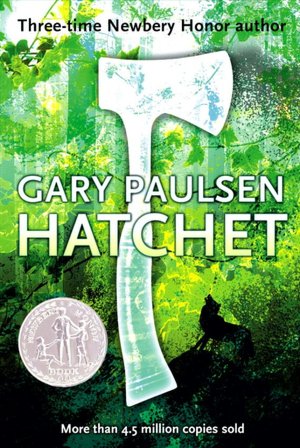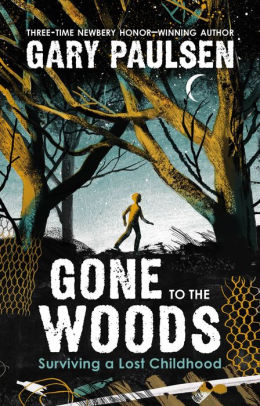Today Betsy and Janie will take a closer look at Gone to the Woods, a memoir by prolific author Gary Paulsen. Paulsen has been a highly recognizable name since winning Newbery honors in 1986 for Dogsong. He is best known for Hatchet (1988, reviewed here), another Newbery honor book that’s gone through numerous reprintings. Not everything he wrote is suitable for younger readers, but in the early days of Redeemed Reader we gave a starred review to Lawn Boy (NOT the more recent, and very controversial novel by the same title).

Few authors can capture the nitty and gritty of living in the wild like he could, and as his memoir shows, he experienced almost everything he wrote about. Paulsen suffered from heart disease since the early 1990s but may not have known the end was near when he wrote Gone to the Woods. He died of cardiac arrest on October 13, 2021, at the age of 82.
A rough childhood yields rich story material
Janie: I’ll confess, Betsy: when I picked up this book it was with some trepidation, I knew Paulsen had lived a rugged life and his childhood was far from idyllic. As his memoir reveals, it was even worse than I thought. His father, a career army officer, was absent for the first six or seven years of his life, and his mother was almost criminally neglectful. The family reunited after World War II in the Philippines, where his father was serving as a liaison officer. But his parents spent most of their at-home time drinking and screaming at each other. The boy roamed the streets of this war-ravaged city alone, surrounded by evidence of Japanese atrocities. Even after his family moved back to the states, home life didn’t improve. There were bright spots we can talk about later, but what harrowing scenes from Paulsen’s early life stuck with you, Betsy?
Betsy: Harrowing is the word, Janie! I couldn’t get over his solo trip at around age 5 from his mother to a place he’d never seen with an aunt and uncle he’d never met… a journey that took DAYS on various trains. A the end, the conductor just left him on the train platform, assuming someone would be there to get him. I know our current generation is accused of helicopter parenting, but surely there’s a middle ground! Paulsen’s experiences in Manila during WWII were utterly horrific, and those stayed with him for life. I appreciated, though, how restrained the narrative is. When we’re looking through his young childlike eyes, we don’t see all the details. We’re processing them along with him, and it’s not until later that we begin to understand just how horrific those experiences in Manila were.
What about you, Janie? Which scenes stand out to you? And what do you think of his narrative “voice” in this book? He uses third person, which is an interesting choice for a memoir, but maybe that distance is necessary for both author and reader, in light of the trauma?

Janie: I think you’re right—third person does put a bit of distance between the author and his experiences, and may blunt the impact for the reader as well. (I believe Paulsen has written memoirs for grownup readers that pull no punches.) I was struck by the same things that stayed with you, namely the train ride and roaming the streets of Manilla after dark—imagine what desperate characters were still at large during that time!
But I was also unexpectedly moved by redeeming memories, like the bread and honey his great-aunt served him on his arrival at their house. The boy was undoubtedly starving after days on a train, so anything would have tasted good. But fresh bread and honey is hard to beat anytime, and it was so heavenly it made him think about God (see the quote in my review). My impression was that he perceived this as a moment of grace. Too soon his mother took him away, and nothing good happened after that until he wandered into the local library. The unnamed librarian introduced him to a world he never even suspected: books. Reading eventually led to writing, and that’s why we have over 200 books written by Gary Paulsen, many of them well worth a read.
Do the few bright moments justify the dark ones? Or to put it another way, who would you recommend this book to, Betsy? And why?
Who was Gone to the Woods written for?
Betsy: You know, Janie, that’s actually the question I struggled with the most: who is this book for? I think every librarian will love it! After all, we love hearing true stories of librarians who believed in the worth of a scruffy kid, handed him a book, and set him on a path such as Paulsen’s: wildly successful author! But it’s really hard to pinpoint an age range for a child or teen reader. I think young teens are probably the target audience (and thus, this book is at the absolute upper end of the Newbery age range, which is 0-14). It would be a hard read for some of them, but Paulsen is reasonably discreet in his comments and explanations. And people do experience this sort of trauma. It’s not a bad thing to experience it vicariously in a book and gain some empathy for those around us who appear sketchy or deadbeat, but who in reality are truly suffering.
Still, the book could use a good solid dose of hope at the end. It sort of peeters out, doesn’t it? All of a sudden, he goes places, sees the world, and writes a book. In about that many words. After a book that dwells on trauma and his heart’s cry for purpose and love, it would have been nice to see a little more of that at the end. I don’t think it’s necessary to have read Paulsen’s fiction to appreciate his memoir, though.
What about you? Who would you hand this book to? How does this book compare to one of his fiction works, like Hatchet? Will teens pick it up and enjoy it?
Janie: Good question. I think it will be most interesting for readers who are already familiar with Paulsen’s work. Any 6th-grader who’s read Hatchet will recognize the author in Brian’s wilderness experience (and also his conflicted feelings about his mother). Language Arts teachers and children’s librarians will be fascinated. Otherwise, I’d recommend it to young teens who prefer nonfiction, and possibly to readers who are going through tough times. You’re right that the story doesn’t really wrap up, but at least there’s a sense of direction at the end, after two decades of aimless wandering. As I said in my review, I have no clue about Paulsen’s spiritual leanings, if any, but his relatives Edy and Sig, the beauty and terror of nature, and that nameless librarian who encouraged him to read introduced notes of grace into his life. And grace is available for everyone.
But since this is a Newbery discussion, what do you think the possibilities are for a medal?
Is Paulsen a sentimental favorite for Newbery gold?
Betsy: I have to confess that I’ve never read Hatchet—or really any of Paulsen’s works. I’ve often felt that those are “must reads” for anyone working in the children’s literature industry because they’re so popular. Reading his autobiography, though, has made me want to finally read Hatchet. So, perhaps that would hold true for younger readers, too.
As to whether Gone to the Woods has enough “distinction” to win the Newbery, I’m not sure. I think an honor is probably more likely. Of course, the committee is made up of real people who are not immune to feelings and sentiment. Paulsen is a longstanding favorite (and he’s won Newbery honors before), and he died just after this book came out. Perhaps the committee will lean more heavily on those sorts of factors, especially on the heels of a couple of years that just seem hard in general for the average U.S. citizen. A pandemic, racial tension, and heated political contests certainly aren’t “fun.” What do you think? Do you expect to see Hatchet in the Newbery lineup?
Janie: When prognosticating the Newbery award, I often find myself thinking in terms of the Motion Picture Academy, which is known to hand out awards not necessarily on the basis of performance but some other criterion (like a well-beloved actor who never received and Oscar and is “owed” one). There’s an importance difference, though: the Academy is a guild of motion-picture professionals that remains the same year to year, whereas each Newbery committee is a distinct group of individuals who may not have the same values as the previous year’s committee. I think Paulsen will get some points for his record and his recent demise, but like you I think a fourth silver medal is more likely than a first gold.
Or another possibility: he’ll win the Printz. His book is more suitable for older readers even though the main character is first seen at age five. In that way, Gone to the Woods resembles last year’s Printz winner, Everything Sad Is Untrue (see our starred review), which was rumored as a Newbery pick but its more mature themes made a YA division more appropriate. The Printz didn’t even exist when Paulsen won his last Newbery honor, so winning it posthumously could be seen as the crown on his career.
We’ll find out on January 24! Meanwhile, check in again on Monday, when Betsy and Megan talk about Fallout.
Support our writers and help keep Redeemed Reader ad-free by joining the Redeemed Reader Fellowship.
Stay Up to Date!
Get the information you need to make wise choices about books for your children and teens.
Our weekly newsletter includes our latest reviews, related links from around the web, a featured book list, book trivia, and more. We never sell your information. You may unsubscribe at any time.
We'd love to hear from you!
Our comments are now limited to our members (both Silver and Golden Key). Members, you just need to log in with your normal log-in credentials!
Not a member yet? You can join the Silver Key ($2.99/month) for a free 2-week trial. Cancel at any time. Find out more about membership here.

